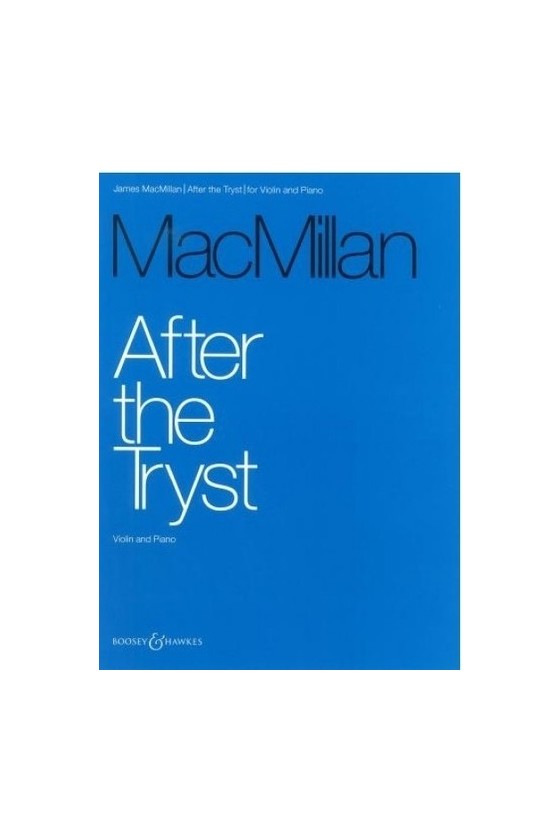MacMillan, James
James MacMillan, a renowned classical composer and conductor, has carved a significant place for himself in the world of music. Hailing from Scotland, MacMillan's compositions have captivated audiences worldwide, blending elements of his Scottish heritage, political beliefs, and deep-rooted Catholic faith.
Early Life and Education
Born on July 16, 1959, in Kilwinning, North Ayrshire, James MacMillan grew up in Cumnock, East Ayrshire. His passion for music began to blossom during his formative years, leading him to pursue formal training in composition. MacMillan studied under the tutelage of Rita McAllister and Kenneth Leighton at the University of Edinburgh before continuing his education with John Casken at Durham University. In 1987, he earned his Ph.D., solidifying his dedication to the craft.
Composing Prolifically and Returning to Scotland
After completing his studies, MacMillan returned to his homeland, Scotland, where he embarked on a prolific composing journey. His compositions showcased a unique blend of influences, drawing from his Scottish roots, political ideologies, and spiritual beliefs. MacMillan's association with the Scottish Chamber Orchestra as an Associate Composer provided a platform for him to collaborate on educational projects, further enriching the Scottish music scene.
Exploring Spirituality and Politics through Music
Spirituality and politics intertwine seamlessly in MacMillan's music, reflecting his deep-rooted Roman Catholic faith and his engagement with social issues. Many of his sacred compositions, such as the evocative "Magnificat" (1999) and various Mass settings, are inspired by his religious beliefs. MacMillan's collaboration with Catholic poet Michael Symmons Roberts and Archbishop of Canterbury Rowan Williams further highlights his commitment to expressing spiritual themes through his music.
One of MacMillan's most politically charged works is "Cantos Sagrados" (1990), a composition that combines Latin American poetry by Ariel Dorfman and Ana Maria Mendoza. This piece intertwines elements of liberation theology with traditional religious texts, serving as a powerful commentary on political repression and a call for solidarity with the marginalized.
Scottish Traditional Music Influence
MacMillan's deep appreciation for Scottish traditional music has left an indelible mark on his compositions. The unmistakable echoes of his heritage can be heard throughout his works, adding a distinctive flavor to his musical language. In 1999, MacMillan's composition, a fanfare, accompanied the Queen into the Scottish Parliament chamber, symbolizing the significance of his Scottish roots.
Confronting Sectarianism and Anti-Catholicism
Known for his outspoken nature, MacMillan has not shied away from addressing social issues through his music. In a speech titled "Scotland's Shame," he passionately denounced sectarianism in Scotland, particularly anti-Catholicism. This powerful statement resonated with audiences, shedding light on the need for unity and tolerance in Scottish society.
Engaging the Audience: Mass Settings for Choir and Congregation
MacMillan's commitment to inclusivity is evident in his approach to composing Mass settings. His Mass commissioned by Westminster Cathedral in 2000 incorporated moments where the audience could actively participate by singing along. Similarly, the St Anne's Mass and the Galloway Mass were designed to be accessible to congregations, requiring minimal musical expertise. This emphasis on involving the audience in the musical experience reflects MacMillan's desire to make his music more inclusive and relatable.
Collaboration with Pope Benedict XVI
A significant milestone in MacMillan's career came in 2010 when he was commissioned to compose a new Mass setting for choir and congregation. This composition was performed at two of Pope Benedict XVI's mass celebrations in the United Kingdom. The first performance took place in Bellahouston Park, Glasgow, on September 16, and the second occurred during the gathering and beatification of John Henry Newman in Cofton Park, Birmingham, on September 19. MacMillan's composition, which included a setting of the scripture "Tu es Petrus" (Matthew 16:18) for the Pope's entrance at Westminster Cathedral, showcased his ability to create deeply spiritual and emotionally resonant music.
Conclusion
James MacMillan's contributions to the world of music are profound and far-reaching. Through his compositions, he has bridged the gap between spirituality, politics, and Scottish heritage, captivating audiences with his unique musical language. MacMillan's unwavering commitment to addressing social issues and engaging the audience reflects his desire to create a more inclusive and meaningful musical experience. As he continues to compose and conduct, James MacMillan's impact on the classical music world remains enduring and inspiring.


